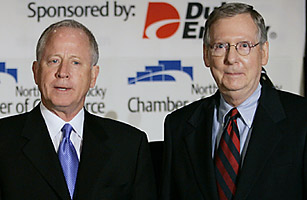
Republican U. S. Sen. Mitch McConnell, right, and Democratic challenger Bruce Lunsford appear together prior to a debate in Erlanger, Ky.
In a year when Republicans find themselves facing surprisingly close congressional races all across the map, it is hard to think of anyone who would have seemed more unlikely for an upset, even a few months ago, than Senate Minority Leader Mitch McConnell. When he ran for a fourth term in 2002, McConnell barely broke a sweat, polling nearly 2-to-1 over his Democratic opponent. But as he told supporters this week: "Unlike six years ago, it's not going to be a coronation. It was fun getting 65 percent of the vote and carrying 113 out of 120 counties, but that was then, and this is now."
And the biggest difference between then and now, as any suffering Republican can tell you, is the economy, which is taking a particularly hard toll on a state that was already one of the poorest in the nation. Like voters around the country, Kentuckians are frustrated with Washington and the Bush Administration. As McConnell acknowledges: "The President is not popular. The economy is certainly slow." And the government bailout of Wall Street has given voters in Kentucky something else to be mad about. Since the financial crisis began to dominate the news last month, McConnell has seen his double-digit lead almost entirely evaporate. Polls now show the Kentucky Senate contest close to a dead heat.
Sensing sudden opportunity in a race they had all but written off, Democrats are now pouring in resources and lending national starpower to the campaign of Democratic challenger Bruce Lunsford. The Democratic Senatorial Campaign Committee is advertising in the state, and former President Bill Clinton is scheduled to campaign with Lunsford on Friday in Paducah and Bowling Green. His wife Hillary was there last month.
Lunsford would seem an unlikely giant-slayer or populist hero. He ran for Governor twice in the past five years, and didn't make it past the primaries either time. In his first bid, in 2003, Lunsford was forced out of the race even before the primary, when it came to light that some of the nursing homes he operated had turned away Medicaid patients. (Lunsford didn't endear himself to the state's Democratic establishment either, when he subsequently endorsed Republican Ernie Fletcher, the eventual victor, in that race — a move that he since has said was a mistake). When Lunsford jumped into the race against McConnell, it seemed the only thing he had going for him was the fact that he had a big enough bank account to fund it himself. Where McConnell's campaign has raised nearly $18 million, Lunsford had to loan $5.5 million to his.